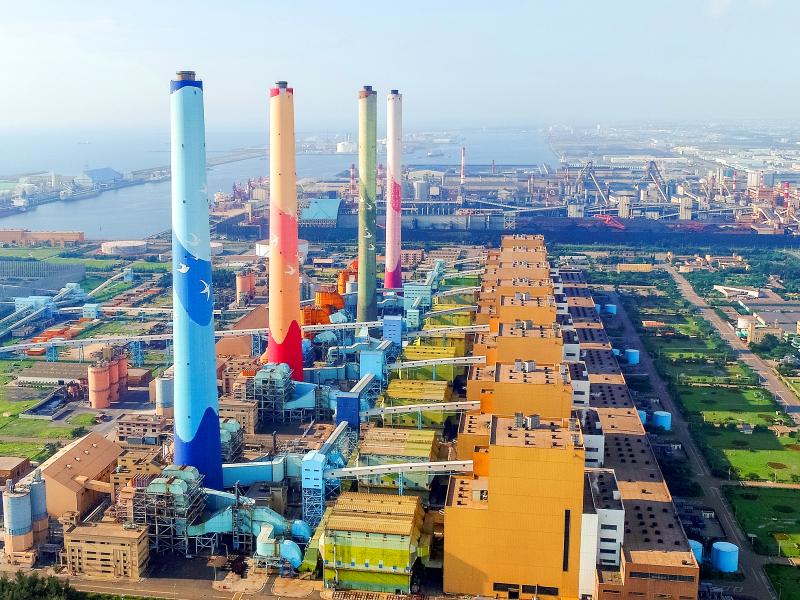Tunghai University on Friday called on the Taichung City Government to acknowledge the public’s will after its survey found that nearly 70 percent of Taichung residents are against restarting Taichung Power Plant’s No. 2 and No. 3 coal-fired generators.
The city government in December last year revoked the operating licenses for two of the plant’s coal-fired generators, after accusing it of contributing to the city’s poor air quality.
The university’s survey found that 79 percent of respondents agreed that the city government should continue to reduce carbon emissions and improve air quality, 67 percent were against restarting the No. 2 and No. 3 units, and 71 percent said the city government has the authority to prevent the plant from restarting them.

Photo courtesy of the Taichung City Government
The plant is operated by state-run Taiwan Power Co (Taipower).
Taipower wants to restart the units to provide more power for the summer, but the city government is against the idea, saying that it would take Taipower to court if it restarts the units without obtaining permission.
In the event that Taipower did so, 73 percent of the respondents said that they would support the city government in taking legal action.
The university commissioned Taiwan Real Survey to conduct the poll from June 10 to June 12. The survey received 845 valid responses and has a margin of error of 3.37 percentage points.
At a news conference to publicize the survey, New Environment Society of Taichung director Chang Chen-nan (張鎮南) said that the power plant should reduce energy production capacity during periods of heavy pollution.
Taichung Tourism and Culture Industries Association deputy director Kuo Ta-hung (郭達鴻) said that while many had relied on the NT$1,000 subsidies the power plant handed out, people no longer want the money; they simply want the power plant to shut down.
Kuo demanded to know what Taichung City Government’s energy policy was.
Huang Chun-ming (黃俊銘), a professor National Sun Yat-sen University’s Department of Applied Chemistry, said that in 2014, 34 per 10,000 people in Taichung had lung cancer, which was lower than the national average of 36 per 10,000.
That number grew to 38.2 per 10,000 people in 2017, exceeding the national average of 36.97, Huang said, calling on the government to swap out the older boiler units with newer models.
Taiwan Economy, Trade and Tourism Association director Tsai Meng-che (蔡孟哲) said that government policies should respect what the public wants.
Separately, Taichung Mayor Lu Shiow-yen (盧秀燕) said that the poll reflected public concern about air pollution.
The central government should not restart the units, Lu said.
Taipower said that both boiler units met operational standards, adding that it plans to restart them to compensate for the large amount of power drawn during summer.
It respects the public’s opinions and is aware of environmental and health concerns, Taipower said, adding that it would strive to balance these concerns with its job of providing a stable power supply.
Additional reporting by Tsai Shu-yuan and Su Chin-feng

Prosecutors in New Taipei City yesterday indicted 31 individuals affiliated with the Chinese Nationalist Party (KMT) for allegedly forging thousands of signatures in recall campaigns targeting three Democratic Progressive Party (DPP) lawmakers. The indictments stem from investigations launched earlier this year after DPP lawmakers Su Chiao-hui (蘇巧慧) and Lee Kuen-cheng (李坤城) filed criminal complaints accusing campaign organizers of submitting false signatures in recall petitions against them. According to the New Taipei District Prosecutors Office, a total of 2,566 forged recall proposal forms in the initial proposer petition were found during the probe. Among those

ECHOVIRUS 11: The rate of enterovirus infections in northern Taiwan increased last week, with a four-year-old girl developing acute flaccid paralysis, the CDC said Two imported cases of chikungunya fever were reported last week, raising the total this year to 13 cases — the most for the same period in 18 years, the Centers for Disease Control (CDC) said yesterday. The two cases were a Taiwanese and a foreign national who both arrived from Indonesia, CDC Epidemic Intelligence Center Deputy Director Lee Chia-lin (李佳琳) said. The 13 cases reported this year are the most for the same period since chikungunya was added to the list of notifiable communicable diseases in October 2007, she said, adding that all the cases this year were imported, including 11 from

China might accelerate its strategic actions toward Taiwan, the South China Sea and across the first island chain, after the US officially entered a military conflict with Iran, as Beijing would perceive Washington as incapable of fighting a two-front war, a military expert said yesterday. The US’ ongoing conflict with Iran is not merely an act of retaliation or a “delaying tactic,” but a strategic military campaign aimed at dismantling Tehran’s nuclear capabilities and reshaping the regional order in the Middle East, said National Defense University distinguished adjunct lecturer Holmes Liao (廖宏祥), former McDonnell Douglas Aerospace representative in Taiwan. If

The Mainland Affairs Council (MAC) today condemned the Chinese Communist Party (CCP) after the Czech officials confirmed that Chinese agents had surveilled Vice President Hsiao Bi-khim (蕭美琴) during her visit to Prague in March last year. Czech Military Intelligence director Petr Bartovsky yesterday said that Chinese operatives had attempted to create the conditions to carry out a demonstrative incident involving Hsiao, going as far as to plan a collision with her car. Hsiao was vice president-elect at the time. The MAC said that it has requested an explanation and demanded a public apology from Beijing. The CCP has repeatedly ignored the desires